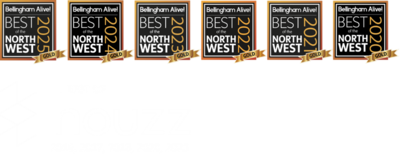

August 1, 2022

At Highline, we aren’t just concerned with the impact we make today; we believe we have a responsibility to future generations too. As such, it has been a pleasure to be able to host a construction management intern the past two summers. Before wrapping up her time with us, Grayce engaged in a little reflection with our office manager, Tera. Once you read the full interview below, we expect you’ll agree that Grayce is a gift to the future of the construction industry.
Tera: We're so happy to be able to host your summer internship. Tell us about what made you interested in doing your internship with us.
Grayce: When I first started thinking about having a career in construction back in high school, I got the opportunity to meet and speak with [Highline President] Trevor. We kind of toyed with the idea that it would be great if I could potentially work for him at some point after I finished my degree. When the time came to look for an internship, Highline was high on my list. I like what Highline stands for and what they are striving to accomplish in the relationships they have with their clients, before and after construction begins and finishes. I like their work with the community, as well as with their workers. I felt that it would be a good fit for me.
Tera: That’s great. It seems like it has been a good fit, as this is actually your second summer here. What sort of things are you learning this time around that are different from your experience here last year?
Grayce: Last summer, I got the opportunity to shadow Highline’s head project manager, which meant I went to onsite meetings and took notes, helped make some callouts on site plans, and got the opportunity to watch how to communicate with clients and subs in a respectful manner. Brent also strongly encouraged me to talk to some of the subs and ask questions. This summer, I have had the opportunity to do some labor work and really familiarize myself with terms and construction practices on the job as well as personally interact with subs. Brent and Trevor advocated about how much you learn just getting your hands dirty on the site, and they are right. I get to experience what my professors have talked about firsthand, and this has helped me start to recognize what types of problems to look out for on a project and potential ways to go about solving issues.
Tera: So, you're going to school for construction management? For folks who may be interested in a similar education, can you speak to some of the options? Are there degree programs as well as certificate programs? How much time do these programs take and what have you liked about the program you're in?
Grayce: There are multiple options for those out there who are interested in getting an education in construction. Typically, there is the 4-year Bachelor of Science degree in construction management. But if going to college is not your calling, there are also certificate programs for construction management. For some of them there is a required amount of onsite experience that you need to complete before you are eligible to take the courses (5 years or more I think). The time required to complete a certificate program may vary depending on the program you choose, but it could be completed in as little as 13 weeks, I believe. So those who are interested should keep in mind that it is a condensed program.
If you are interested in going after some type of degree or certification in construction, it might be helpful to know what type of construction you prefer such as residential, heavy civil, industrial, or commercial. This is not really necessary to start out; its just good to have an idea. The knowledge and skills needed to perform higher management tasks – such as site supervisor and project manager – may differ slightly between the different types of construction. There are many colleges and certification programs that specialize in specific areas. For example, I know Central Washington University has a strong safety program, if you want to be a safety inspector. If a college education just isn’t for you, there are also great trade schools. I feel like trade school isn’t talked about enough. I think it is a good option if you want to specialize in a trade, like electrical, HVAC, or plumbing.
As for the program I am currently in [at Washington State University], I have enjoyed that they have taken the time to set their students up for success in the industry. They really push us to work with not just our own program, but with other programs – architects, engineers, and landscape architects – to get the opportunity to work together and solve issues. This mirrors how it might be when we are working in the industry. I have also really enjoyed the networking that my school has provided with this program. It is fun to meet other Cougs, hear their stories about their time in the program, and learn more about what they have taken from it.
Tera: It sounds like there are a lot of options. That’s great. So, when it comes to your own education and career path, why construction management? Did you grow up in the trades or discover your passion some other way?
Grayce: I did not grow up in the trades. I have always been fascinated with the insides of people’s houses and that led me to think I would like to do something with design. I knew architecture was out of the picture for me, as the skills needed were not what I was into. However, while viewing career talks in high school, an architect brought in some site plans. I was obsessed with them. I still thought I wanted to be an interior designer because I wanted to see the finished product of the structure. I visited schools for interior design. At one school, I heard a professor talk about construction management. He told us some of us were going to wind up in construction management; we just didn’t know it yet. The professor sought me out after the presentation and told me he thought I was going to be a construction manager. I waved off the idea at the time. Even though I was intrigued, I still thought I was going to choose interior design. The following summer before picking out a college, I took a week-long interior design course. Turns out I really hated that course and realized that I needed to explore construction management after all. I guess I can thank that professor for planting that seed in my head.
Tera: I imagine the work you do is not without its challenges. What are some of the challenges you've encountered while working to establish your career path?
Grayce: Being a project manager requires one to have a good variety of skills. Even though I am getting a degree in construction management, I am still gaining practical, on-the-job experience [performing carpentry tasks]. One must have good communication, leadership, and problem-solving skills, plus have a good work ethic and be able to take criticism. I am quite introverted, so I am not the best at networking and putting myself out there. At the beginning, it was hard for me to talk to subs and ask questions about what they are doing. The thought of talking and interacting with clients was a little scary too. Communicating well with lots of different people makes me think I need a psychology degree to understand how to manage situations differently depending on the person. It has helped that Brent has been a great mentor/leader for me and has shown me the ropes. It has become easier and more comfortable for me to step out of my comfort zone.
The other challenge is building my confidence in my own knowledge and experience. As a residential project manager, I am sometimes overwhelmed by how much I need to know. A construction management degree has equipped me with the broad knowledge needed to pursue this career, but, as I have interned with Highline, I have realized how much more there is to learn beyond textbooks and lectures. I want to feel more prepared than I sometimes feel. I know throughout my career that I will continue to learn something new every day. That’s the mindset I want to have.
Tera: What advice would you give to an individual considering a career in construction?
Grayce: Network! Networking is so important. Talk to as many people in this field as you can to learn more about the industry. Construction has so many options. So, if you are unsure of what you really want to do within this industry, keep trying out options until the shoe fits.
View all trades and subs as equals. Respect and kindness go a long way in the industry.
Always be open to asking questions as no one expects you to know everything. I think about that Confucius quote: "The man who asks a question is a fool for a minute, the man who does not ask is a fool for life.”
Lastly, have fun with it. The work can be draining but also rewarding. I also would say don’t let people put you down for pursuing it. No matter how easy it looks, even pouring concrete is harder than one would think!
Tera: That’s all good advice, Grayce. What do you think you'll remember most about your time as an intern here?
Grayce: I will definitely remember the great community Highline brings to every project. I am grateful to have worked alongside so many amazing people and to have had the opportunity to learn from them.
Tera: I’m really glad your experience has been so positive. You've almost completed your program. What's next? Where do you see your career path heading?
Grayce: I see my career path heading in the direction of small projects so I can increase my knowledge and experience away from the classroom. I want to work my way up until I am able to manage my own construction projects.
Tera: When it comes to construction management, what sort of skills or traits do you think it's most important to have?
Grayce: One must have good communication, construction knowledge, leadership, and problem-solving skills. One should have a good work ethic and patience because there are many times when things just don’t go as planned. It helps to be detail-oriented and to dislike taking short cuts that aren’t necessary. You need to be someone that people can depend on, reliable and consistent.
Tera: We're going to be posting your interview on our website. Is there anyone you'd like to acknowledge publicly for the ways they've supported your ambitions?
Grayce: I want to thank Trevor for allowing me the opportunity to work with his amazing company, paving the way for my career. To Brent for being my mentor – showing me the ropes, encouraging me to do great things, and for encouraging my learning. To Evan and Yuseph for being patient with me and teaching me the labor side of construction, pushing me out of my comfort zone. And to everyone else I’ve worked with at Highline!
Tera: Awesome. Thank you so much for all you’ve brought to Highline in your time here. We hope you will keep in touch. It will be exciting to see what’s in store for you next.
Grayce: I will stay in touch. Thank you!


– Matt Whitten, Bellingham, WA